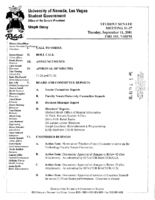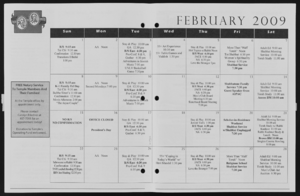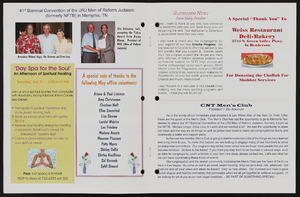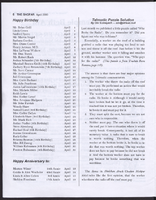Search the Special Collections and Archives Portal
Search Results
Jim Murren (Nevada COVID-19 Task Force) oral history interview conducted by Magdalena Martinez and Kelliann Beavers: transcript
Date
Archival Collection
Description
From the Lincy Institute "Perspectives from the COVID-19 Pandemic" Oral History Project (MS-01178) -- Community organization interviews file.
Text

Law School Study for the University of Nevada, Las Vegas (bound)
Date
Archival Collection
Description
A bound version of the "Law School Study for the University of Nevada, Las Vegas" by Dean Willard H. Pedrick, College of Law, Arizona State University, and Professor Lorne Seidman, Chairman, Department of Finance, College of Business and Economics, University of Nevada, Las Vegas. From the University of Nevada, Las Vegas William S. Boyd School of Law Records (UA-00048).
Text

Transcript of interview with Alan Clancy by Su Kim Chung, by February 12, 2015
Date
Archival Collection
Description
Alan Clancy grew up in Sydney, Australia, the second son of famous ballroom-dancing parents. He recalls that he had incredible energy as a child, and, therefore, his parents enrolled him in the Shirley de Paul Studio to learn gymnastics, tap, ballet, and jazz. He also became a soprano singer. This training did well for him for as he went through high school he won trophies in sports and participated in musical productions. Eventually, because of a neighboring friend, Kay Dickerson, Alan moved to the Rudas Acrobatic Studio where he received further training and eventually contracted with Tibor Rudas to participate in an entertainment group called “The Las Vegas Dancers”. He was only seventeen when the group boarded a ship for Hong Kong in an enterprise which would eventually allow the dancers to entertain around the world for approximately two and a half years. When the group returned, Alan auditioned for the Tommy Leonetti television show and then for Les Girls in Sydney. Eventually Tibor Rudas appeared with a contract for Alan, when he had just turned twenty-one, to fly to Las Vegas to work in the Folies Bergere at the Tropicana Hotel and Casino. When he arrived in Las Vegas, he was surprised at the size of the city and the hotels but was overly impressed by the neon signs, the showrooms with their nude dancers, the costuming, magnificent sets, the choreography, and the dress of the patrons. He remembers his first night performing in the Folies and the amount of stars in the audience, for example, Elvis Presley, Liberace, and Zsa Zsa Gabor. Alan goes on to describe the many people that he met in Las Vegas, working in various shows, and the many friendships made over the years. However, he eventually became interested in opening his own vintage clothing store, Vintage Madness, near the Strip. He talks about his many customers, the stores around him, his creative ways of acquiring items to sell and the success that was made. Unfortunately, during the middle of one night the store burned to the ground which left Alan devastated. Eventually, however, he purchased three buildings on Fourth Street and opened an art gallery, a coffee shop, and a small stage. His mercantile interest allowed him to leave show business and briefly open a store in Laguna Beach, Southern California. It wasn’t long until Barclay Shaw asked him to work in “Splash” at the Riviera Hotel in Vegas and, therefore, he returned to show business. However, Shaw, his friend, died and so did his mother and he lost interest in his stores, renting them out. Consequently, he returned to live in California and began working with Aids patients. Alan returned to Las Vegas for the reunion of the cast of Folies Bergere and noticed the many changes made in Las Vegas from when he first arrived to perform at the Tropicana Hotel.
Text

Transcript of interview with Marc Ratner by Barbara Tabach, August 23, 2016
Date
Archival Collection
Description
Marc Ratner moved to Las Vegas when he was in the seventh grade in 1957. His father became owner of a retail beauty supply business. It also was about the time Marc became a bar mitzvah. The Ratner family belonged to Temple Beth Sholom, as did everyone at the time, and a favorite memory he recalls is of sneaking a glimpse of crooner Eddie Fisher and actress Elizabeth Taylor getting married there. While growing up, Marc showed no particular interest in being a star athlete. He played little baseball and participated in track as a long jumper. Nevertheless, on the day of this oral history interview, Marc is sitting in his office surrounded by sports memorabilia. It is all a testimony, a museum highlighting his decades of officiating and regulating sports events. His stories include newsworthy boxing episodes that ranged from the infamous ?Fan Man? parachutist incident in 1963 during the Evander Holyfield vs Riddick Bowe fight at Caesars and the 1997 ?Bite Fight? when Mike Tyson took a bite out of Evander Holyfield?s ear. v In 2016, Marc was inducted into the International Boxing Hall of Fame, an extraordinary honor for a nonparticipant. He has long been a fan of the sport and talks about the first fight he ever attended, becoming a ring inspector in 1985 and then starting a new phase of his career in 2006, as Vice President of Regulatory Affairs for the Ultimate Fighting Championship [UFC]. In addition, Marc has dedicated much his life blowing the whistle at high school and college sports: he?s officiated on the football field for several conferences, bowl games and mentors would-be officials. He served as Nevada State Athletic Commission executive director for two decades. Among his community involvement is serving on the board of Jewish Family Services Agency. In 1997 he was honored by the National Council of Christians and Jews. Marc Ratner moved to Las Vegas when he was in the seventh grade in 1957. His father became owner of a retail beauty supply business. It also was about the time Marc became a bar mitzvah. The Ratner family belonged to Temple Beth Sholom, as did everyone at the time, and a favorite memory he recalls is of sneaking a glimpse of crooner Eddie Fisher and actress Elizabeth Taylor getting married there. While growing up, Marc showed no particular interest in being a star athlete. He played little baseball and participated in track as a long jumper. Nevertheless, on the day of this oral history interview, Marc is sitting in his office surrounded by sports memorabilia. It is all a testimony, a museum highlighting his decades of officiating and regulating sports events. His stories include newsworthy boxing episodes that ranged from the infamous ?Fan Man? parachutist incident in 1963 during the Evander Holyfield vs Riddick Bowe fight at Caesars and the 1997 ?Bite Fight? when Mike Tyson took a bite out of Evander Holyfield?s ear. v In 2016, Marc was inducted into the International Boxing Hall of Fame, an extraordinary honor for a nonparticipant. He has long been a fan of the sport and talks about the first fight he ever attended, becoming a ring inspector in 1985 and then starting a new phase of his career in 2006, as Vice President of Regulatory Affairs for the Ultimate Fighting Championship [UFC]. In addition, Marc has dedicated much his life blowing the whistle at high school and college sports: he?s officiated on the football field for several conferences, bowl games and mentors would-be officials. He served as Nevada State Athletic Commission executive director for two decades. Among his community involvement is serving on the board of Jewish Family Services Agency. In 1997 he was honored by the National Council of Christians and Jews. Marc Ratner moved to Las Vegas when he was in the seventh grade in 1957. His father became owner of a retail beauty supply business. It also was about the time Marc became a bar mitzvah. The Ratner family belonged to Temple Beth Sholom, as did everyone at the time, and a favorite memory he recalls is of sneaking a glimpse of crooner Eddie Fisher and actress Elizabeth Taylor getting married there. While growing up, Marc showed no particular interest in being a star athlete. He played little baseball and participated in track as a long jumper. Nevertheless, on the day of this oral history interview, Marc is sitting in his office surrounded by sports memorabilia. It is all a testimony, a museum highlighting his decades of officiating and regulating sports events. His stories include newsworthy boxing episodes that ranged from the infamous ?Fan Man? parachutist incident in 1963 during the Evander Holyfield vs Riddick Bowe fight at Caesars and the 1997 ?Bite Fight? when Mike Tyson took a bite out of Evander Holyfield?s ear. v In 2016, Marc was inducted into the International Boxing Hall of Fame, an extraordinary honor for a nonparticipant. He has long been a fan of the sport and talks about the first fight he ever attended, becoming a ring inspector in 1985 and then starting a new phase of his career in 2006, as Vice President of Regulatory Affairs for the Ultimate Fighting Championship [UFC]. In addition, Marc has dedicated much his life blowing the whistle at high school and college sports: he?s officiated on the football field for several conferences, bowl games and mentors would-be officials. He served as Nevada State Athletic Commission executive director for two decades. Among his community involvement is serving on the board of Jewish Family Services Agency. In 1997 he was honored by the National Council of Christians and Jews.
Text

Meeting minutes for Consolidated Student Senate, University of Nevada, Las Vegas, September 11, 2001
Date
Archival Collection
Description
Text





